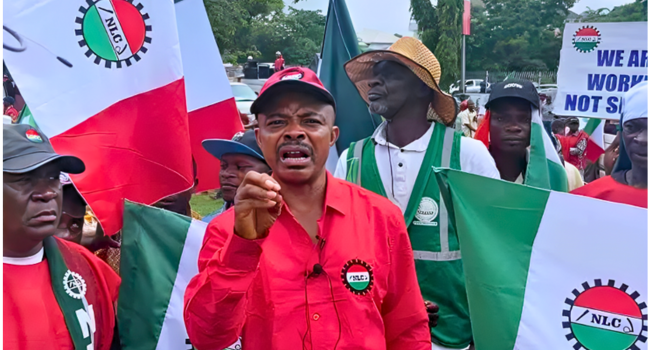The Nigeria Labour Congress (NLC) has recently hinted that its minimum wage demands may rise to N1 million per month if the current economic challenges persist.
The NLC President, Joe Ajaero, cited the worsening inflation and currency depreciation as the main drivers of this proposal. He also expressed dissatisfaction with the government’s failure to implement the previous agreements on the temporary wage awards and palliatives for workers.
The current minimum wage, which was set by the 2019 Minimum Wage Act, remains at N30,000 per month despite the dwindling state of the economy.
The act also provides for a review of the minimum wage every five years and exempts some categories of workers from its application, such as part-time, commissioned, or seasonal workers.
While the NLC‘s position may reflect the reality and frustration of many Nigerian workers who are struggling to cope with the rising cost of living and the declining value of their income, it also raises some questions and concerns about the feasibility and implications of such a drastic increase in the minimum wage.
First, how realistic is the N1 million minimum wage proposal, given the current state of the economy and the fiscal situation of the government?
According to the latest data from the National Bureau of Statistics, the inflation rate in Nigeria was 18.3 per cent in January 2024, the highest in over a decade. The exchange rate of the Naira to the Dollar was N1,400 in February 2024, a 56 per cent depreciation from N900 in October 2023, when the N200,000 minimum wage proposal was made.
The government’s revenue and expenditure have also been severely affected by the COVID-19 pandemic, the oil price slump, and the security challenges. The government’s budget deficit for 2024 was projected at N5.6 trillion, or 3.6 per cent of GDP, while the debt service to revenue ratio was estimated at 83 per cent. With these economic indicators, how can the government afford to pay N1 million minimum wage to its workers, without resorting to more borrowing, taxation, or subsidy removal?
Second, what are the likely consequences of the N1 million minimum wage proposal, if implemented, on the economy and society?
While the N1 million minimum wage may seem attractive and beneficial to the workers, it may also have some negative and unintended effects. It may fuel inflation and currency depreciation further, as the increase in money supply and demand may not be matched by the increase in productivity and output. This may erode the purchasing power and welfare of the workers and the consumers and make the N1 million minimum wage inadequate and unsustainable.
The proposed wage may also worsen unemployment and poverty, as the increase in labour cost may force some employers, especially in the private sector, to lay off some workers, reduce their working hours, or close down their businesses.
While the NLC‘s proposal may be a bargaining strategy or a pressure tactic, it may also be an opportunity for constructive dialogue and negotiation between the government, the labour unions, and other stakeholders, to find a win-win solution that can balance the interests and expectations of all parties.
A possible alternative and solution is a gradual and conditional increase in the minimum wage, based on the performance and improvement of the economy and the fiscal situation of the government. This may require a regular review and adjustment of the minimum wage, in line with the inflation rate, the exchange rate, and the revenue and expenditure of the government.
Another is a comprehensive reform of the economy and the governance, that can address the root causes and structural issues of inflation, currency depreciation, and fiscal imbalance.
While NLC’s proposal for a N1 million minimum wage reflects the genuine concerns and frustrations of Nigerian workers, it also raises significant questions about its feasibility and potential consequences. Given the current state of the economy, marked by high inflation, currency depreciation, and fiscal challenges, implementing such a drastic increase in the minimum wage may not be realistic or sustainable without exacerbating existing economic problems.




















